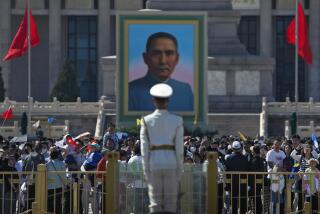Media Hail China’s War on SARS
- Share via
BEIJING — After weeks of silence, China’s state-run media released a flood of reports Monday on the government’s handling of the SARS epidemic, both to reassure panicky citizens and to portray the firing of two key officials as a sign of a more open and accountable leadership.
From the stodgy official newspaper People’s Daily to the most commercial tabloids, front pages were dominated by Sunday’s dismissal of China’s health minister and Beijing’s mayor. The media trumpeted the government’s declaration of war on severe acute respiratory syndrome, a disease that the discredited officials had called “under effective control.”
SARS has killed 92 people and infected more than 2,000 throughout China, out of more than 200 dead and 3,900 infected worldwide.
Mounting domestic and international pressure led to Beijing’s reversal of its pattern of denial regarding the epidemic.
Since taking over leadership of the nation and the Communist Party in recent months, President Hu Jintao has distinguished himself from Beijing party insiders and elites by cultivating a populist image, and many papers carried an editorial Monday from the official New China News Agency that sought to capitalize on that image. The piece hailed Hu’s work to combat SARS as a demonstration of the new leadership’s “decisive, down-to-earth new political style” and its “spirit of utmost responsibility to the broad masses of people.”
Some papers also printed the text of a Sunday news conference at which health officials admitted to grossly underreporting the number of SARS cases in Beijing.
By contrast, other media took advantage of increased editorial freedom to rail against the insufficient democracy and accountability that aggravated the crisis.
“False reporting is more fearsome than an epidemic,” said Monday’s Beijing Star Daily. The paper also carried an April 18 editorial from Shanghai’s Wenhui Daily under the headline “Citizens Must Not Be Deprived of Their Right to Know.”
“The root of the problem is that, in some areas, the establishment of democratic politics is inadequate to meet the needs of the masses,” it said. “Some of our government departments are only accountable to their superiors and not to those below them.”
Yu Guoming, director of the Public Opinion Research Center at People’s University, said the SARS crisis is symptomatic of a political culture in which officials are more often held accountable for opening their mouths than for keeping them shut.
The crisis, Yu predicted, could “accelerate the establishment of institutions for the release of government information about important events.” As an example, he cited the U.S. Freedom of Information Act.
Beijing media Monday also carried reports confirming the firing of Mayor Meng Xuenong. Meng and Health Minister Zhang Wenkang were stripped of their party posts Sunday, but the formality of removing them from office was left to the municipal and national legislatures, respectively.
According to state media, He Guoqiang, head of the Communist Party’s organization department, explained to a meeting of Beijing officials Sunday that Meng was dismissed “to strengthen the Beijing region’s prevention of SARS and ensure the overall stability of the capital.”
He avoided explicit criticism of Meng’s performance and added that Meng had “expressed his resolute support for this job change.”
As fear of SARS increased the number of face masks on Beijing’s streets and reduced the number of tourists and shoppers, state-run media also reported a raft of measures to contain the spread of the disease.
The State Development and Reform Commission said China would allocate $349 million to beef up disease control facilities to combat SARS. Also, state media reported that on Monday, China’s civil aviation administration began requiring air passengers to file health reports declaring any fevers, coughs or other SARS-like symptoms.
The New China News Agency reported that the president had visited a government laboratory where researchers used genetic material from the coronavirus believed to cause SARS to create a test that can detect the virus within an hour.
More to Read
Sign up for Essential California
The most important California stories and recommendations in your inbox every morning.
You may occasionally receive promotional content from the Los Angeles Times.













